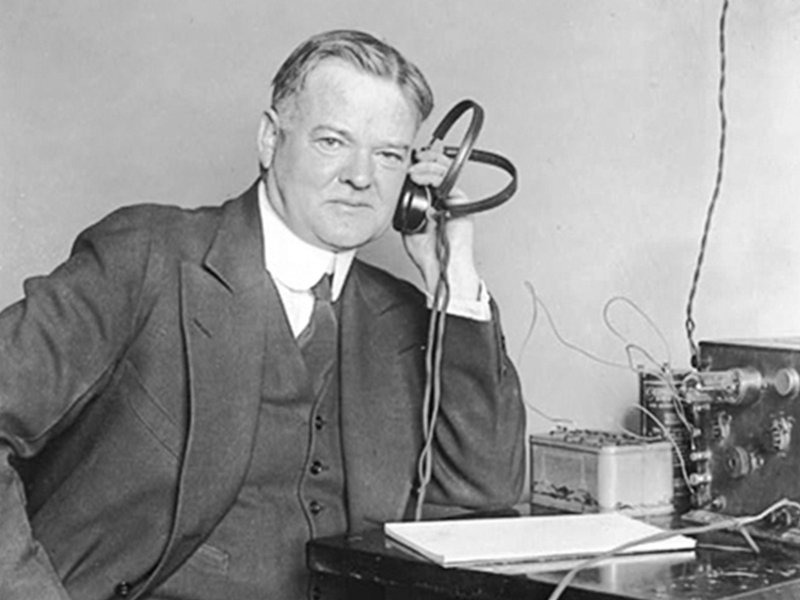President Herbert Hoover’s nickname gives insight into how the American public perceived him during his presidency. His nickname “The Great Engineer” came from his early career as a civil engineer, and it represented his flood control work when the Mississippi River burst its banks in 1927. However, the Great Depression ravaged the country just months after Herbert Hoover took office and blamed him.
Herbert Hoover was described as straight brown hair with hazel eyes who stood about five feet and eleven inches tall. He possessed a reddish complexion and a husky built. He had a lot of ambition and was very focused on the tasks at hand.
Self-Made Man
Herbert Hoover worked in the mining industry as a young man, and through his hard work and dedication, he amassed wealth and strength. Hoover embodied the self-made man’s notion, suggesting that his success solely focused on his work ethic and perseverance. Hoover rose from a poor Quaker family in Iowa, orphaned as a kid, to become a successful businessman. He was a multimillionaire by the time World War I broke out in 1914.
He demanded the same from others because he was a model of productivity himself. Herbert Hoover was known for focusing on the details rather than the overall importance of an issue. He was a drab speaker who barely looked up from his prepared file.
Many scholars believe he was more of an ideologue than a pragmatist. A pragmatist is someone less committed to an ideology and more concerned with what is realistic or doable. In contrast, an ideologue is firmly committed to an ideology or theory and usually unable to compromise. Historians point out that after the 1929 stock market crash, Hoover steadfastly insisted that the situation could be addressed without government interference. However, it’s worth remembering that Hoover enlisted the federal government’s assistance at the end of his tenure.
Direct and Honest
His commitment to integrity defines Herbert Hoover’s presidency. Deception, mind games, and comforting lies are all at odds with his preference for coping with the reality of the circumstances he faced with straight honesty.
He is known for being calm and self-assured, as well as cool and aloof. In social settings, he was not particularly warm, but he was typically straightforward and brief. Herbert Hoover was also notorious for being obstinate and often arrogant. He was a man who stood firm no matter what others thought. He was resilient to criticism, according to some scholars, and appeared to believe that he was right even though facts indicated otherwise.
Always by the book
He believed that things worked better when established rules were present, so he was hesitant to break them or try new things, even if the risk was negligible. Genuinely unstructured environments almost paralyzed Herbert Hoover.
Responding to Crisis
Despite an undeserved, false, yet long-lasting reputation, President Hoover tried to end the Depression even though he was described as a do-nothing president. Many thought he merely regarded the Great Depression as an unfortunate fact of economic life that had to be endured; in fact, he did more to deal with it than any previous president had ever done in a time of financial disaster. Many people saw Herbert Hoover as a bitter, hard, cold man who didn’t care for others. However, you must note that Hoover was a great humanitarian. He was genuinely concerned for the well-being of others. Hoover was a well-known philanthropist before becoming president. His combination of conservative economics and humanitarianism was described by one historian as follows. “Hoover formed a unique philosophy—one combining responsibility for the welfare of others with an unshakable confidence in free enterprise and competitive individualism,” he said.
Herbert Hoover took a conservative, business-oriented approach to the economy, relying on Americans’ voluntary contributions rather than government action. What he attempted was inadequate and often poorly done, and his public reputation increased as a result.
The secret to economic growth, according to Herbert Hoover, was restoring the business community’s confidence in the US economy. Only by reinvesting money back into the economy would the country be able to recover. As a result, he adopted a conservative, business-oriented approach to recovery for more than three years.
Conclusion
Known for his reliability and hard work, he was good at forming and upholding a secure and steady environment for himself and his loved ones. His dedication was invaluable in many areas, including his personal growth.
Herbert Hoover avoids making many assumptions, preferring to examine his surroundings, verify facts, and come up with realistic solutions. He is a straight shooter. After Herbert Hoover reached a decision, relaying the information required to accomplish his objective, trusting others to understand the situation and respond quickly. He had little patience for indecisiveness, but he lost even more patience when his chosen path was questioned by unrealistic hypotheses, especially if he overlooked vital information.
US Presidents | ||
